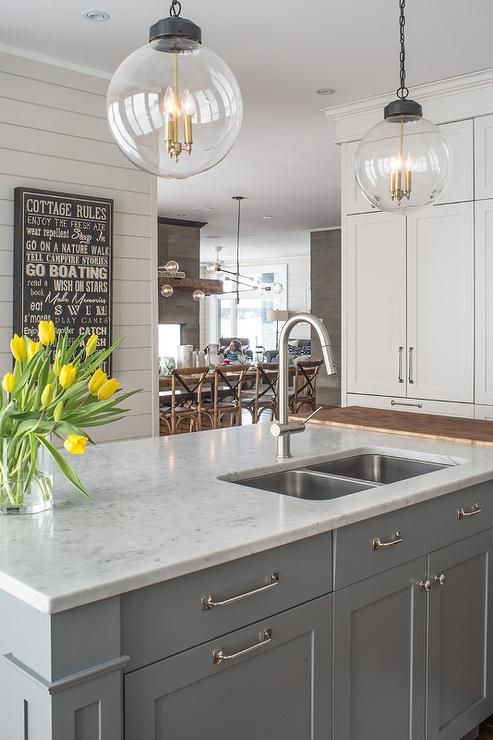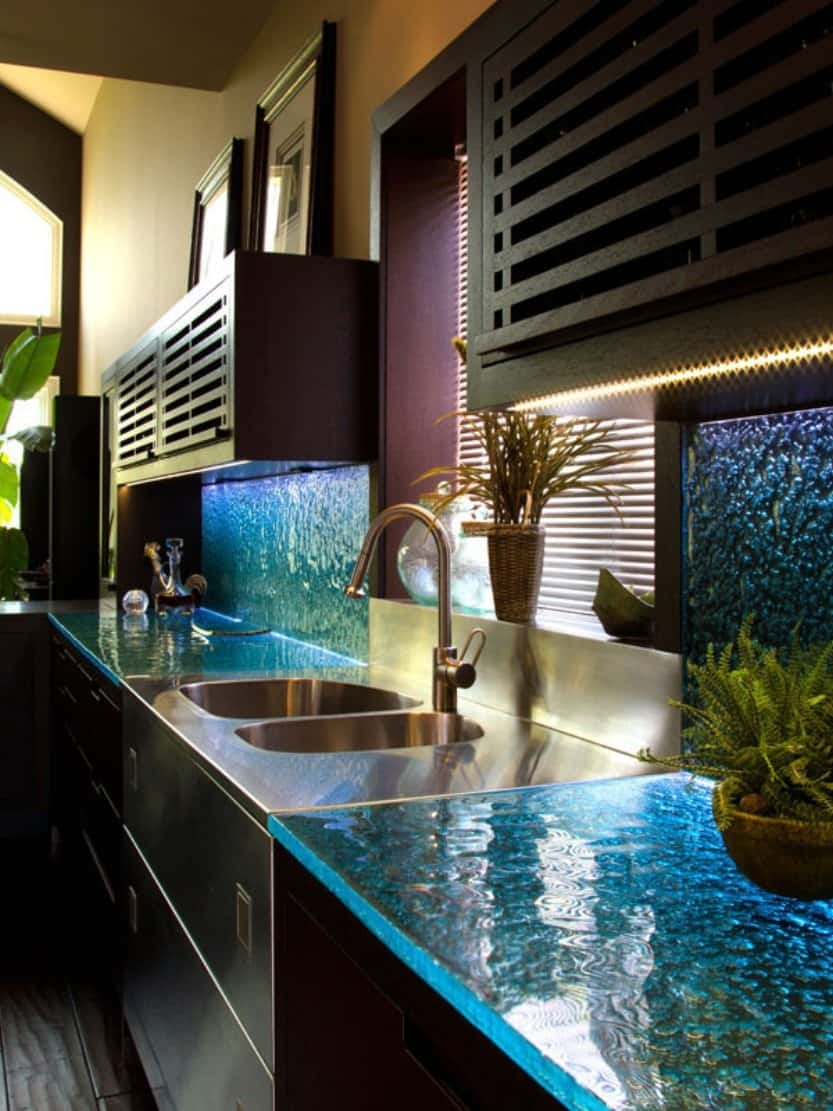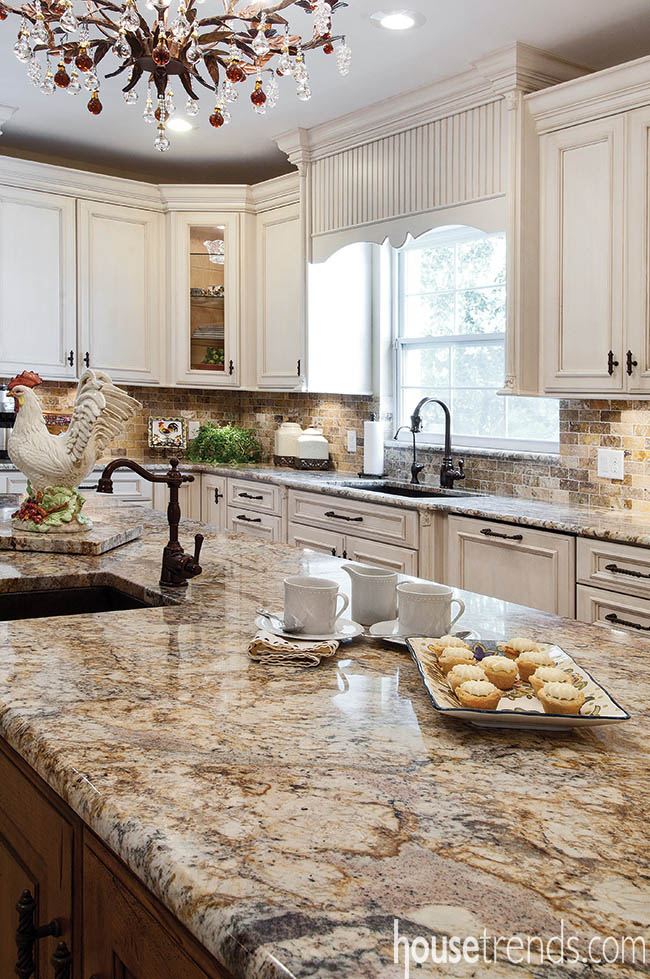When it comes to kitchen countertops, choosing the right material, color, and design can transform the entire look of your kitchen. With so many options available today, it’s easy to feel overwhelmed by the choices. Some countertops bring timeless elegance, while others offer practical benefits like resistance to heat, stains, and scratches. The material you choose will greatly influence the feel and functionality of your kitchen. Here, I’ll take you through some ideas that cover various styles, materials, and functional aspects of kitchen countertops to help you find the perfect fit.
Quartz countertops have gained popularity for their durability and range of colors. Made from engineered stone, quartz offers a non-porous surface, which means it’s resistant to stains and doesn’t harbor bacteria—a big win for families that prioritize cleanliness. One of my favorite things about quartz is that it mimics the look of natural stones, like marble or granite, but with a higher level of durability and less maintenance. Quartz is also an environmentally friendly choice, as many manufacturers use recycled materials. If you want a clean, modern look, try a sleek, white quartz countertop. Alternatively, go for veined or textured patterns if you’re aiming for a more traditional or rustic aesthetic.

For those who want a luxurious feel, marble countertops are a classic choice. The stunning, natural veining in marble creates a unique look in each slab, making every countertop distinct. Marble is perfect for anyone who values elegance, but it does come with a few caveats: marble is more prone to staining and scratching than other stones. If you choose marble, you’ll need to seal it regularly and be cautious about acidic foods and liquids, which can leave marks. However, for those who don’t mind the extra care, marble offers an unmatched, timeless beauty that adds value to any kitchen space.
Granite is another popular natural stone that brings a touch of nature into the kitchen. It’s available in a wide range of colors and patterns, from earthy tones to vibrant reds, greens, and blues. Granite is known for its heat and scratch resistance, making it a top choice for cooks who need a sturdy workspace. Like marble, granite requires sealing to maintain its beauty, but it’s slightly more resilient to stains and scratches. If you’re looking for a countertop that can handle high traffic and still look stunning, granite is a great investment that adds an upscale feel to your kitchen.

Concrete countertops have become a trendy choice for those looking for a contemporary or industrial look. Concrete can be customized in almost any color and can be molded to fit any space. Its raw, edgy appearance works particularly well in modern or loft-style kitchens. However, concrete requires regular sealing to prevent stains, as it is naturally porous. Additionally, concrete countertops are heavy and may require reinforced cabinets, but for those who love a bold statement, they’re worth the investment. One of the benefits of concrete is its versatility, as you can embed stones, tiles, or even small objects into it for a completely personalized touch.
Butcher block countertops bring warmth and a touch of rustic charm to the kitchen. Made from wood, they’re a beautiful contrast to metal and stone materials commonly found in kitchen design. Butcher block countertops are particularly popular among those who love to cook, as you can use them as a cutting surface. However, they do require regular oiling to prevent drying and cracking. You’ll also want to avoid prolonged exposure to water, as wood can warp over time. For those who prioritize warmth and character over durability, butcher block countertops are a fantastic choice.

For an eco-friendly kitchen, consider recycled glass countertops. These are made by mixing crushed glass with resin or cement, resulting in a colorful and unique countertop that’s sure to be a conversation starter. The glass particles create a beautiful, light-reflective surface that can brighten up any kitchen. Recycled glass countertops are relatively easy to maintain and are resistant to stains and heat. However, they can be susceptible to scratches, so they might not be the best choice for heavy-use kitchens. With recycled glass, you can showcase your commitment to sustainability without compromising on style.
Solid surface countertops, like those made from Corian, are known for their seamless appearance and versatility. They’re made from acrylic or polyester resins, which makes them non-porous and easy to clean. Solid surface countertops are a good choice for families with young children, as they’re resistant to stains and minor scratches. If damaged, solid surface countertops can be repaired relatively easily. They’re available in a wide range of colors and patterns, so you can match them to almost any kitchen style. These countertops are also a great option if you want an integrated sink, as the material can be molded for a seamless finish.
Stainless steel countertops offer a sleek, professional look and are incredibly durable. Resistant to heat and stains, stainless steel is a favorite in commercial kitchens, but it has found its way into residential spaces as well. It’s also antibacterial, making it ideal for those who prioritize hygiene. The downside of stainless steel is that it can show fingerprints and scratches, though these can add to the material’s natural patina over time. Stainless steel works well in modern, minimalist kitchens, adding a touch of sophistication while being highly functional.

Laminate countertops are a budget-friendly option with a wide variety of colors and designs, including styles that mimic wood, stone, and other materials. Laminates have come a long way in terms of quality and appearance, and many high-end options look surprisingly realistic. They’re easy to clean and don’t require sealing, making them low-maintenance. However, laminate is prone to scratching and chipping, so it’s best suited for light to moderate use. If you want a stylish kitchen without the high price tag, laminate can give you that look for less.
Ceramic tile countertops are another cost-effective choice that allows for endless customization. You can select tiles in various colors, shapes, and patterns to create a unique, mosaic-like design. Tile countertops are heat-resistant and easy to replace if damaged, but the grout lines can be challenging to keep clean. Regular sealing can help but be prepared for some maintenance. For those who love a creative, handmade aesthetic, tile countertops offer a way to add personal flair to the kitchen.
Soapstone is a lesser-known natural stone that’s gaining popularity for its rich, deep color and smooth texture. Often dark gray or black, soapstone has a warm, soft feel compared to granite or marble. It’s highly resistant to heat and stains, and small scratches can easily be sanded out. Soapstone countertops develop a natural patina over time, which many people find appealing. If you prefer a look that gets better with age, soapstone might be the perfect countertop material for your kitchen.

For a unique look, consider a terrazzo countertop, which is made by embedding marble, granite, or glass chips in concrete or resin. Terrazzo is highly customizable and available in countless colors and patterns. It’s durable and low-maintenance but can be pricey. Terrazzo works well in both modern and vintage-inspired kitchens, giving your space a retro feel with a touch of luxury. If you want your kitchen to stand out, terrazzo is a bold, beautiful choice that’s sure to impress.
Glass countertops offer a sleek, contemporary look and can be backlit for a unique, glowing effect. These countertops are non-porous, so they’re easy to clean and highly resistant to stains. Tempered glass is incredibly strong and can withstand high temperatures, but glass countertops can be prone to scratches. For an ultra-modern, minimalist kitchen, a glass countertop can add a light, airy feel. You can even choose textured or colored glass for added interest.
Lava stone is an exotic choice that combines durability with vibrant colors. After being glazed and heated, lava stone becomes highly resistant to heat, stains, and scratches. Its surface has a slight shine and often features small crackles, adding to its unique character. Lava stone is on the pricier side, but it’s a standout material that requires minimal maintenance and works well in both traditional and contemporary kitchens. If you’re looking for something truly unique, lava stone is worth considering.
Paper composite countertops are made from recycled paper and resin, offering an eco-friendly alternative that’s also incredibly durable. They’re resistant to heat and stains, and their matte finish provides a soft, natural look. Paper composite countertops are lightweight, which makes them easy to install, and they come in earthy tones that blend well with various kitchen styles. They’re a sustainable option that still provides the functionality and beauty you need in a kitchen.

Common Mistakes to Avoid
One common mistake is overlooking maintenance needs. Materials like marble and butcher block require special care, so if you’re not prepared to maintain them, they may not be the best choice. Another mistake is prioritizing aesthetics over functionality; some materials may look beautiful but aren’t durable enough for high-use kitchens.
Also, don’t forget to consider the weight of certain materials like concrete or granite, which may require reinforced cabinets. Finally, avoid choosing countertops solely based on current trends. Choose materials that reflect your lifestyle and will still look stylish for years to come.

What’s the most durable kitchen countertop material?
Granite and quartz are among the most durable materials, offering excellent resistance to scratches and heat. Both materials are suitable for heavy-use kitchens and require minimal maintenance, although quartz does not need sealing like granite does. For those who prioritize both durability and low upkeep, quartz is often the best choice.
How often do I need to seal my countertop?
The frequency depends on the material. Natural stones like granite and marble should ideally be sealed annually to protect against stains. However, quartz and stainless steel countertops do not require sealing, making them lower-maintenance choices for busy households.
Can I place hot pans directly on my countertop?
Placing hot pans directly on countertops is generally not recommended, especially for materials like laminate, quartz, and wood. Heat can damage the surface or cause discoloration. Granite and stainless steel are more heat-resistant, but using trivets is still advisable to prolong the countertop’s life.

Are there eco-friendly countertop options?
Yes, several eco-friendly choices exist, including recycled glass, paper composite, and certain brands of quartz. These materials often use recycled content and have a lower environmental impact. If sustainability is important to you, look for options with certifications that indicate eco-friendliness.
How do I choose the best color for my countertop?
Your countertop color should complement your overall kitchen design. For a timeless look, consider neutral tones like white, beige, or gray, which pair well with most styles. If you prefer a bolder look, choose a countertop with veining or unique colors that can serve as a statement piece.
What’s the best countertop for a small kitchen?
For small kitchens, light-colored countertops like white quartz or glass can help make the space feel larger and brighter. Opt for materials with a reflective surface, such as polished granite or glass, to create a sense of openness. Consider thin countertops for a sleek, minimalist look that won’t overwhelm the space.

Related Posts:
- Sustainable Kitchen Countertops
- Tuscan Kitchen Countertops
- Tile Over Formica Kitchen Countertop
- Dark Countertops In Small Kitchen
- Most Popular Kitchen Countertops 2022
- Metal Edging For Kitchen Countertops
- Kitchen Countertops Bangalore
- Red Quartz Kitchen Countertops
- How Much For New Kitchen Cabinets And Countertops
- Kitchen Designs With Butcher Block Countertops